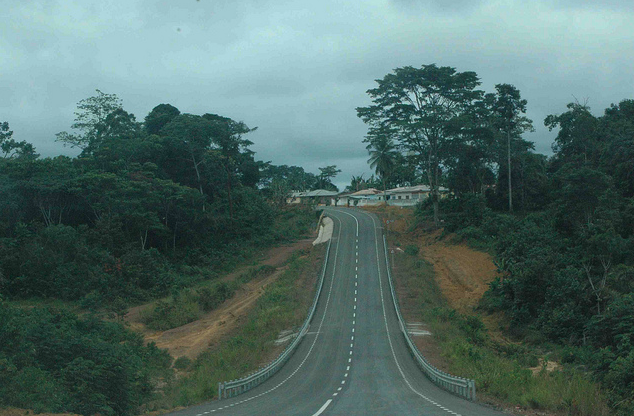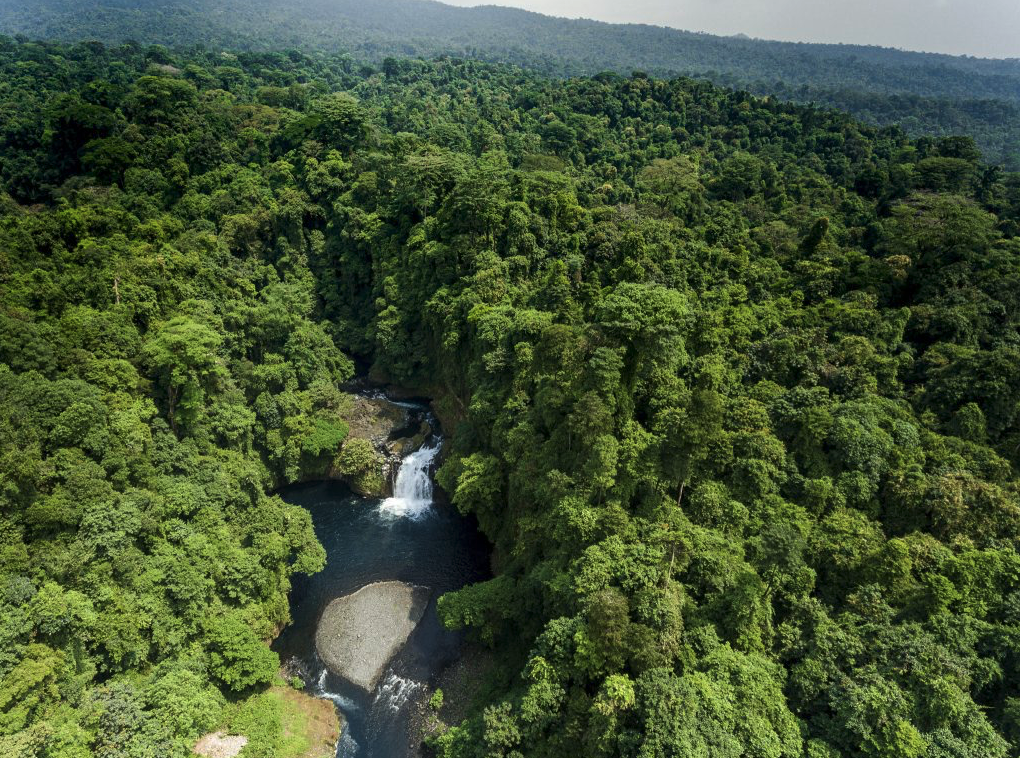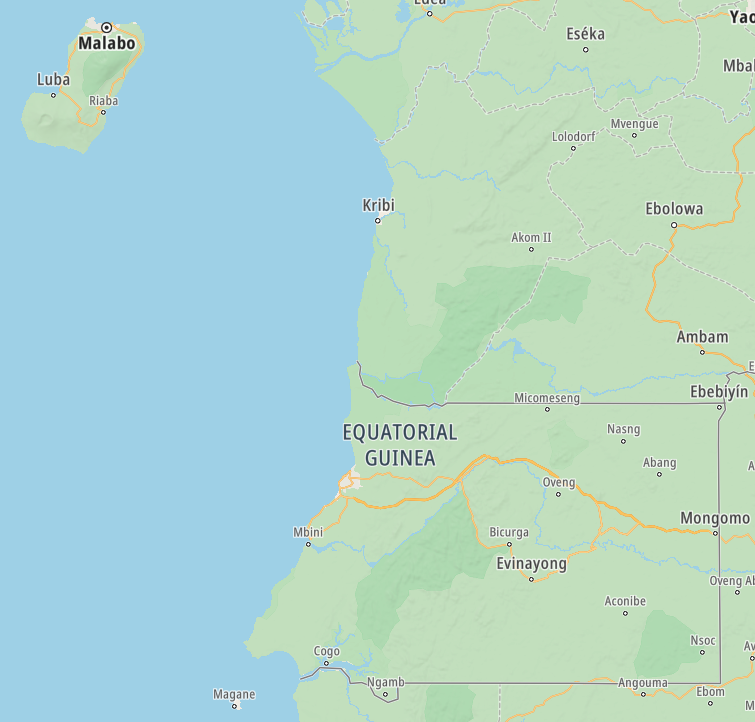Equatorial Guinea / República de Guinea Ecuatorial – Let’s explore here
What’s it like in Equatorial Guinea ?
Equatorial Guinea is a relatively small but rich country in central west Africa – it’s about the size of Albania or Belgium. It’s actually split into two parts – one part on the mainland of Africa, and the other consisting of five islands.
The main island is Bioko, which contains the capital, Malabo. For conspiracy fans, Bioko used be called Fernando Po, which is the centre of quite a bit of the plot in the Illuminatus trilogy. A new capital is currently being built on the mainland, Ciudad de la Paz.
The country consists mostly of coastal forests and mangroves. The highest point is the volcano, Pico Basilé, on Bioko, at 9,879 ft (3,011 m) above sea level. Its only land borders are with Cameroon and Gabon.
The population of Equatorial Guinea is around 1.8 million people (2024), about one in six of whom live in the capital, Malabo.

A bit about the history of Equatorial Guinea
Early History and Indigenous Groups
The indigenous peoples of the region include the Fang, Bubi and other ethnic groups. The Bubi people, who predominantly live on Bioko Island, have a long history in the area, while the Fang people, who inhabit the mainland, were influential in the region’s political and social structures before European colonisation.
Colonial Period and Spanish Rule
In the late 19th century, Spain established its colonial presence in the region. In 1778, Spain formally acquired Bioko Island, then known as Fernando Po, from Portugal in a treaty. The Spanish also took control of the mainland (Río Muni) in the late 19th century, creating Spanish Guinea. The Spanish colonisation of the region was marked by the exploitation of the land and people, especially through forced labour. The island of Bioko became a key base for the Spanish, and many plantations were set up, cultivating crops like cocoa, coffee and timber.
Path to Independence
During the mid 20th century, African independence movements were gaining momentum, and Spanish Guinea was no exception. In 1959, Spanish Guinea was granted the status of an overseas province of Spain, allowing for a local assembly and limited self governance. However, calls for full independence grew stronger. On 12 October 1968, Equatorial Guinea became independent, with Francisco Macías Nguema, a former schoolteacher, becoming the country’s first president.
Macías Nguema’s Dictatorship
Following independence, Francisco Macías Nguema established a brutal and repressive regime. He declared himself president for life and adopted the title of ‘Unique Leader’. His government was characterised by widespread human rights abuses, including political purges, arbitrary arrests and executions. Macías Nguema’s policies severely isolated Equatorial Guinea, and the country became one of the most repressive states in Africa. He nationalised the economy, particularly the oil industry, and pursued a policy of autarky, but this led to economic decline.
Coup and the Rise of Teodoro Obiang Nguema Mbasogo
In 1979, Macías Nguema was overthrown in a military coup led by his nephew, Teodoro Obiang Nguema Mbasogo, who had been a key figure in the coup. Obiang became the new president and quickly took control of the country. His government was more pragmatic, focusing on economic stability and reopening relations with the international community. However, his rule has also been characterised by authoritarianism, corruption and human rights abuses, with opposition groups facing suppression. Obiang’s long rule has made him one of the longest serving leaders in Africa.
Oil Discovery and Economic Development
In the late 20th century, significant oil reserves were discovered off the coast of Equatorial Guinea, transforming the country’s economy. The discovery of oil in the 1990s brought immense wealth to the country, making Equatorial Guinea one of the richest countries in sub-Saharan Africa in terms of GDP per capita. However, much of this wealth has been concentrated in the hands of the political elite, and the country remains plagued by widespread poverty, inequality and corruption.
Political Environment and Human Rights Issues
Under Obiang’s leadership, Equatorial Guinea has been criticised for its lack of political freedoms, the absence of opposition parties, and the suppression of free speech. The government maintains strict control over the media and political discourse. Despite occasional promises of reforms, the political landscape remains largely unchanged, with Obiang continuing to rule with little opposition. Human rights organisations have regularly reported on abuses, including arbitrary detention, torture and suppression of dissent.
Recent Developments and Challenges
In recent years, Obiang has faced increasing international pressure over human rights violations and corruption. The country remains a one party state, with the Democratic Party of Equatorial Guinea, led by Obiang, dominating the political system. While the oil wealth has brought some economic development, there are continued issues of poverty, high unemployment and a lack of basic infrastructure and social services for the majority of the population.
Modern Equatorial Guinea
Equatorial Guinea remains one of Africa’s most politically stable countries, but its political and economic systems are deeply flawed. Oil continues to be the backbone of the economy, but its wealth has not been widely distributed among the population. The government’s strict control over the country’s affairs and the lack of political pluralism have resulted in limited democratic progress. Despite these challenges, Equatorial Guinea remains an important player in Central Africa, largely due to its oil reserves and strategic location.

Equatorial Guinea road trip
Our Equatoguinean road trip is part of a much larger African road trip.
Our current planned road trip though Equatorial Guinea takes us from Cameroon through the centre of the country, before moving on to Gabon. Hopefully our journey will improve our knowledge of this intriguing and beautiful country, and enable us to meet some interesting people. We’ll be updating this page at that time – don’t forget to check back 🙂
Map of Equatorial Guinea

What’s it like to drive in Equatorial Guinea?
They drive on the right hand side of the road in Equatorial Guinea. In the main, roads are very poor, with many being unsurfaced dirt tracks. Roads on Bioko are markedly better, especially in the capital. Driving standards are also poor.
Do you require an international driving permit in Equatorial Guinea?
We’ve created a dedicated page to driving abroad, which answers this question, and more, which you might find helpful.
Can you use your UK driving license when driving through Equatorial Guinea?
We’ve created a dedicated page to driving abroad, which answers this question, and more, which you might find helpful.
Do I need a carnet de passages to drive in Equatorial Guinea?
A Carnet de Passages is required to overland in Equatorial Guinea. We’ve created a dedicated page to driving abroad, which answers this question, and more, which you might find helpful.
What is the weather like in Equatorial Guinea?
The rainy season in Equatorial Guinea is from February to June and September to December. Rainfall is higher on the coast than inland. The dry season is from November to March. The best time to visit is between December and February. The worst months are September to November.
What currency do they use in Equatorial Guinea?
In Equatorial Guinea they use the Central African CFA franc. Cash is widely used. The use of credit / debit cards is not widely accepted. Travellers cheques are not readily accepted. There are very few ATMs outside the capital, Malabo (which is on an island 20 miles off the coast) or the port of Bata.
The Central African CFA franc is used in Cameroon, Central African Republic, Chad, Republic of Congo, Equatorial Guinea and Gabon.
You should make yourself aware of the amount that your bank charges you for using credit and debit cards abroad. Often credit cards are cheaper for purchasing items directly, and for withdrawing cash from ATMs.
What language do they speak in Equatorial Guinea?
They mostly speak Spanish in Equatorial Guinea, although French and some Portuguese is also spoken. English is not widely spoken.
What time zone is Equatorial Guinea in?
Remember, when you’re planning your next trip to take a look at what time zone it’s in.
Do I need a visa to visit Equatorial Guinea?
We’ve created a dedicated, more comprehensive page on visas, which you should find helpful. Check it out!
Is wild camping legal in Equatorial Guinea?
Yes, wild camping is fine in Equatorial Guinea.
What plug / socket type do they use in Equatorial Guinea?
In Equatorial Guinea they use plug / socket types C and E.


Health in Equatorial Guinea
Is it safe to drink water in Equatorial Guinea?
No, it is not safe to drink tap water in Equatorial Guinea. Bottled water is readily available throughout the country.
What vaccinations are required for Equatorial Guinea?
This NHS website is kept up to date with all relevant information on vaccinations in Equatorial Guinea.
Phones in Equatorial Guinea
What is the country calling code for Equatorial Guinea?
The country calling code for Equatorial Guinea is +240
What are the emergency phone numbers in Equatorial Guinea?
- The emergency number for police in Equatorial Guinea is: 114
- In Equatorial Guinea, the emergency number for traffic police is: 116
- In Equatorial Guinea, the emergency number for ambulance is: 115
- The emergency number for fire in Equatorial Guinea is: 112
If you’ve got someuseful info that you’d like to share, let us know!
And don’t forget to check out all the other pictures!
